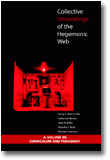
Collective Unravelings of the Hegemonic Web
Edited by:
Becky L. Noël Smith, University of Alabama
Katherine Becker, Lakehead University, Orillia
Libbi R. Miller, California State University, Fresno
Natasha S. Reid, University of Arizona
Michele D. Sorensen, University of Regina
A volume in the series: Curriculum and Pedagogy. Editor(s): The Curriculum and Pedagogy Group.
Published 2014
Collective Unravelings of the Hegemonic Web represents the culmination of work that emerged from 2013 Curriculum & Pedagogy annual conference. The notion of the hegemonic web is the defining theme of the volume. In this collection, authors struggle to unravel and take apart pieces of the complex web that are so deeply embedded into normative ways of thinking, being and making meaning. They also grapple with understanding the role that hegemony plays and the influence that it has on identity, curriculum, teaching and learning. Finally, scholars included in this volume describe their efforts to engage and undergo counter-hegemonic movements by sharing their stories and struggles.
CONTENTS
The James T. Sears Award. Foreword: On Hegemony - Peril or Promise? Jessica A. Heybach. Introduction: Our Gracious Nod to New Orleans. Poem: Bad Collective Memory: Refl ections On New Orleans, November 2013 Curriculum And Pedagogy Conference, Brad Walkenhorst. SECTION 1: UNRAVELING. “The Black Atlantic”: Reconceptualizing The “South” As An Afro-Franco-Creole Space, Petra Munro Hendry. Social Reproduction and Teacher Education, Elizabeth Deuermeyer. Writing Student Affairs: Discursive Shifts and the Challenges of Holistic Education on American College Campuses, Paul Eaton. Why Experience Matters: Legal Pedagogy, Positionality, and the Human Rights Curriculum, Sujata Gadkar-Wilcox. A Curricular Exploration of The Boondocks for Art Education: A Critical Race Pedagogy of Identity in Black Visual Culture Part II, Alphonso Walter Grant. Exploring Complex Learning Systems through the Plays of William Shakespeare, Danielle Klein. SECTION 2: UNDERSTANDING. The Haunted Curriculum: Memory, Pedagogy, Trauma, Jessica Baker Kee. Unraveling the Tangled Threads of Memory as Praxis: Empowering Hispanic Teacher Candidates to Teach in the Twenty-first Century and (Re)Discovering My Self, Diana H. Cortez-Castro. Troubling “Family”: How Primary Grade Teachers Negotiate Hegemonic Discourses of Family, Amy Shema. Creating Space for Students, Daniel Becker. SECTION 3: UNDERGOING. Making Spaces for Community in the Curriculum: Broadening Boundaries to Understand Our Place in the World, Sharon Peck. The Juxtaposition of Aesthetic Reading, Digital Literacies and the Common Core, Heather Rogers Haverback. Restructuring Schools within Societal Confines, Denise Gordon, Tamara Choate, Julie Fisher, and Martha Sullivan. Reclaiming Teacher Resistance: A Call for Principled Resistance in a Democracy, Jocelyn Weeda. Critical Resistance to Teach For America: Challenging Power, Privilege, and White Supremacy, Stephanie Anders, Ashana Bigard, Ruth Idakula, Kerry Kretchmar, Hannah Price, Rebecca Radding, Hannah Sadtler, and Beth Sondel. Imagining Alternatives to Education Reform: The Save Our Schools Campaign For Artful Resistance, Morna McDermott and Becky L. Noël Smith.
-
Paperback9781623967772
Web price: $45.04 (Reg. 52.99)
-
Hardcover9781623967789
Web price: $80.74 (Reg. 94.99)
- eBook9781623967796

- EDU000000 - EDUCATION: General
- EDU007000 - EDUCATION: Curricula
- EDU029000 - EDUCATION: TEACHING METHODS & MATERIALS: General
-
 BIPOC Alliances
Building Communities and Curricula
BIPOC Alliances
Building Communities and Curricula
-
 Critical Intersections In Contemporary Curriculum & Pedagogy
Critical Intersections In Contemporary Curriculum & Pedagogy
-
 Ideating Pedagogy in Troubled Times
Approaches to Identity, Theory, Teaching and Research
Ideating Pedagogy in Troubled Times
Approaches to Identity, Theory, Teaching and Research
-
 Liminal Spaces and Call for Praxis(ing)
Liminal Spaces and Call for Praxis(ing)
-
 Making A Spectacle
Examining Curriculum/Pedagogy as Recovery From Political Trauma
Making A Spectacle
Examining Curriculum/Pedagogy as Recovery From Political Trauma
-
 The Kaleidoscope of Lived Curricula
Learning Through a Confluence of Crises 13th Annual Curriculum & Pedagogy Group 2021 Edited Collection
The Kaleidoscope of Lived Curricula
Learning Through a Confluence of Crises 13th Annual Curriculum & Pedagogy Group 2021 Edited Collection
-
 Who Are You Without Colonialism?
Pedagogies of Liberation
Who Are You Without Colonialism?
Pedagogies of Liberation

